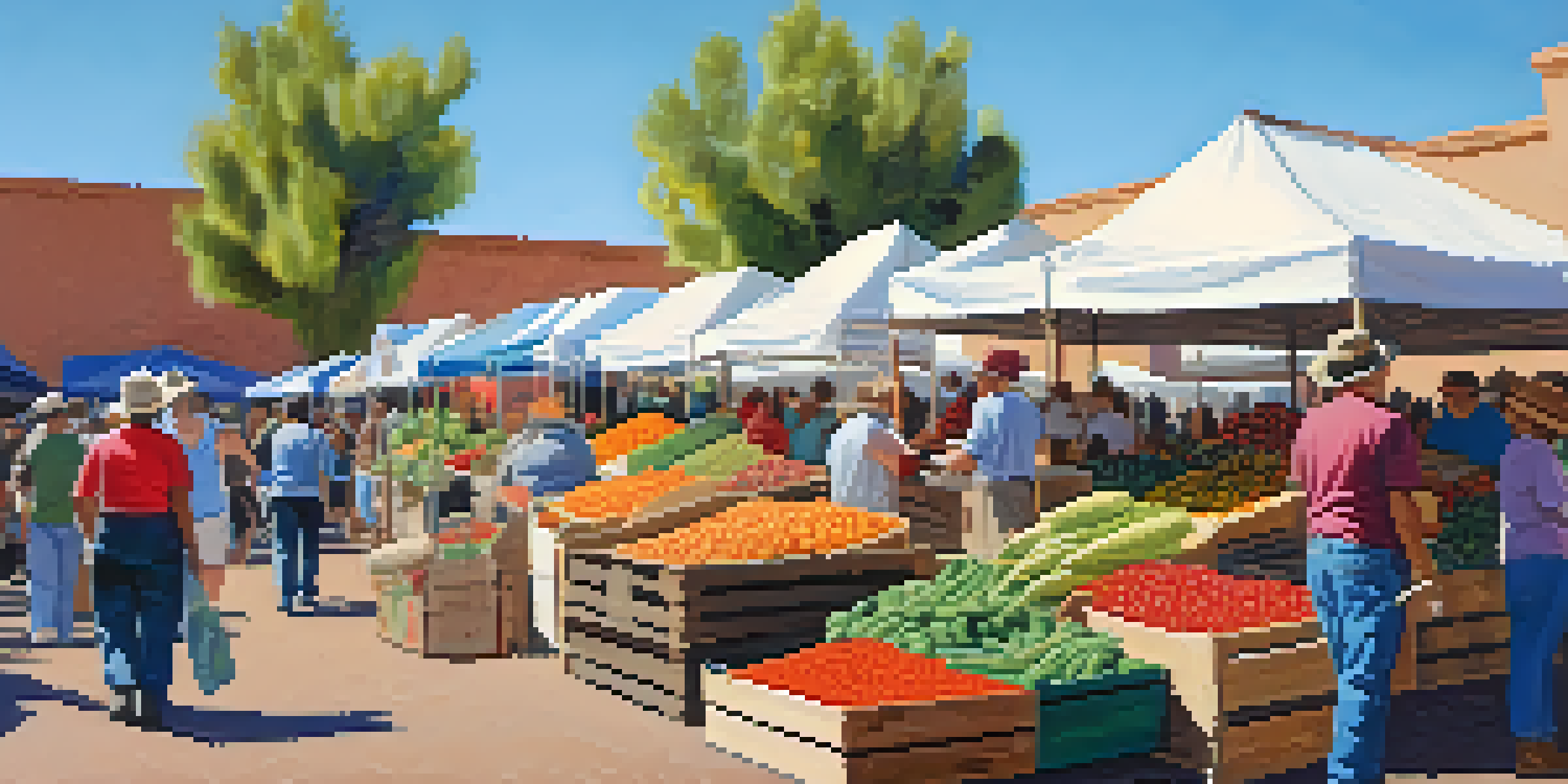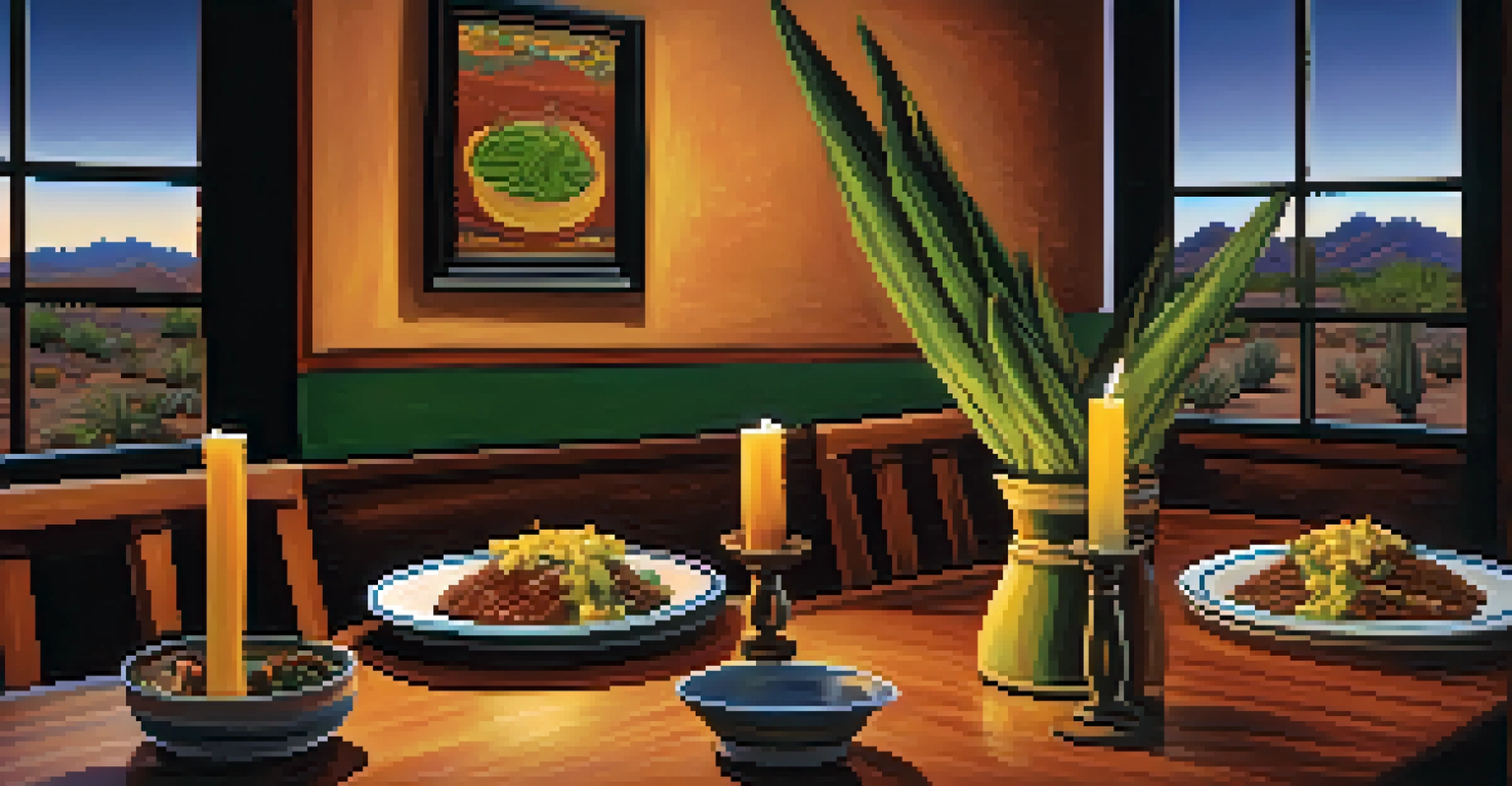Tucson's Culinary Heritage: Flavors from the Past to Present

Understanding Tucson's Culinary Roots and Influences
Tucson's culinary heritage is a rich tapestry woven from various cultures, primarily influenced by Native American, Mexican, and Spanish traditions. Each group brought unique ingredients and cooking techniques, creating a vibrant food scene that tells a story of resilience and adaptation. For instance, the indigenous peoples utilized local ingredients like corn, beans, and squash, which became staples in the region's diet.
Food is a central activity of mankind and one of the single most important reasons for human connection.
As time progressed, the arrival of Spanish settlers introduced new flavors and cooking methods, like the use of olive oil and spices. This blending of cultures laid the foundation for what we now recognize as Tucson's unique cuisine. The influence of Mexican cooking is particularly strong, with dishes like tamales and enchiladas becoming beloved local favorites.
Today, Tucson's food scene continues to evolve, showcasing both traditional recipes and modern interpretations. Chefs pay homage to the past while experimenting with flavors, ensuring that Tucson's culinary heritage remains dynamic and relevant.
The Role of Local Ingredients in Tucson's Cuisine
Local ingredients play a crucial role in defining Tucson's culinary identity. The Sonoran Desert is home to a variety of native plants and animals, many of which have become integral to local dishes. For example, prickly pear cactus, mesquite flour, and chiltepin peppers are often featured in recipes, adding unique flavors that reflect the region's geography.

Farmers' markets and community-supported agriculture initiatives have made it easier for chefs and home cooks alike to access these fresh, local ingredients. This not only supports local farmers but also promotes sustainability by reducing the carbon footprint associated with food transport. It's a win-win for both the community and the environment.
Tucson's Culinary Heritage Explained
Tucson's cuisine is a vibrant blend of Native American, Mexican, and Spanish influences, showcasing a rich history of resilience and adaptation.
Incorporating these ingredients into everyday cooking allows Tucson residents to connect with their culinary heritage. From traditional recipes passed down through generations to innovative dishes that celebrate local flavors, the emphasis on local sourcing is a testament to Tucson's commitment to preserving its culinary roots.
Celebrating Tucson's UNESCO City of Gastronomy Designation
In 2015, Tucson earned recognition as the first UNESCO City of Gastronomy in the United States, a title that celebrates the city's rich culinary heritage. This designation acknowledges the importance of food in Tucson's cultural identity and promotes sustainable practices in gastronomy. It also highlights the city's commitment to preserving its culinary traditions while embracing innovation.
The discovery of a new dish does more for the happiness of mankind than the discovery of a new star.
The designation has spurred a growing interest in Tucson's food scene, attracting food enthusiasts and tourists eager to explore its diverse offerings. Festivals, culinary tours, and special events showcase local chefs and restaurants, allowing visitors to experience the flavors that define Tucson. It's a celebration of food that brings the community together and invites outsiders to partake in Tucson's culinary journey.
Being a UNESCO City of Gastronomy has also encouraged local chefs to experiment and elevate traditional dishes, blending them with contemporary techniques. This fusion of past and present reflects the city's dynamic food culture and ensures that Tucson remains a culinary destination for years to come.
Traditional Dishes That Define Tucson's Culinary Scene
Tucson's culinary scene is filled with iconic dishes that have stood the test of time. From the beloved Sonoran hot dog, wrapped in bacon and topped with a variety of condiments, to the rich and flavorful carne asada, these dishes tell a story of the city's culinary evolution. Each bite is a reminder of the diverse influences that have shaped Tucson's cuisine over the years.
Another standout dish is the green corn tamale, which showcases the region's agricultural bounty. Made with fresh masa and filled with sweet corn, these tamales are often served with a side of salsa, offering a delightful blend of flavors. This dish, along with others, reflects the importance of corn in Tucson's culinary heritage, rooted in ancient traditions.
Local Ingredients Shape Flavors
The use of regional ingredients like prickly pear and mesquite flour is essential in defining Tucson's culinary identity and supports local sustainability.
As diners experience these traditional dishes, they not only enjoy the flavors but also gain insight into the history and culture of Tucson. Each meal becomes an experience, connecting people to the land and its history, fostering a deeper appreciation for the city's rich culinary landscape.
The Influence of Food Festivals on Tucson's Culture
Food festivals play a significant role in celebrating and preserving Tucson's culinary heritage. Events like the Tucson Meet Yourself festival bring together local chefs, food vendors, and artisans, creating a vibrant atmosphere filled with the sights and smells of diverse cuisines. These festivals provide an opportunity for the community to connect and celebrate their shared love for food.
During these events, attendees can sample a plethora of dishes, from traditional recipes to modern culinary creations. This not only promotes local businesses but also encourages chefs to showcase their innovations, highlighting the ever-evolving nature of Tucson's food scene. It's a celebration of creativity and collaboration that fosters community spirit.
Moreover, food festivals often feature cooking demonstrations and workshops, allowing attendees to learn about traditional cooking techniques and local ingredients. This educational aspect helps to pass on culinary knowledge to future generations, ensuring that Tucson's rich culinary heritage continues to thrive.
Modern Culinary Innovations in Tucson
While Tucson's culinary roots are deeply embedded in tradition, modern chefs are embracing innovation to create new dining experiences. Many are experimenting with fusion cuisine, blending traditional flavors with international influences to craft unique dishes that reflect the city's diverse population. This creativity is pushing the boundaries of what Tucson cuisine can be.
Restaurants are also focusing on sustainability and farm-to-table practices, ensuring that they support local farmers while providing fresh, high-quality ingredients. This commitment to sustainability not only enhances the dining experience but also promotes a healthier environment. It's a trend that resonates with both locals and visitors alike, making Tucson a leader in responsible gastronomy.
Food Festivals Foster Community Spirit
Food festivals in Tucson celebrate culinary heritage and innovation, bringing the community together through shared experiences and local flavors.
Additionally, the rise of food trucks and pop-up restaurants has introduced an exciting dynamic to Tucson's culinary scene. These mobile kitchens often feature innovative twists on classic dishes, allowing chefs to explore their creativity while offering accessible dining options. This new wave of culinary innovation keeps Tucson's food scene fresh and exciting, attracting food lovers from near and far.
Tucson's Unique Dining Experiences: Beyond the Plate
Dining in Tucson is not just about the food; it's about the overall experience. Many restaurants offer immersive experiences that engage all the senses, from live music to art installations. This blend of culture and cuisine creates a vibrant atmosphere that enhances the dining experience, making it memorable for guests.
Some establishments even host events that celebrate Tucson's culinary heritage, such as traditional cooking classes or themed dinner nights. These experiences allow diners to connect with the culture and history behind the dishes, deepening their appreciation for Tucson's food scene. Guests leave not only satisfied but enriched by the stories and traditions behind their meals.

Furthermore, the strong sense of community in Tucson plays a significant role in the dining experience. Many restaurants are family-owned and operated, fostering a warm and inviting atmosphere where customers feel like part of the family. This connection between the restaurant and the community enhances the overall experience, making dining in Tucson truly special.